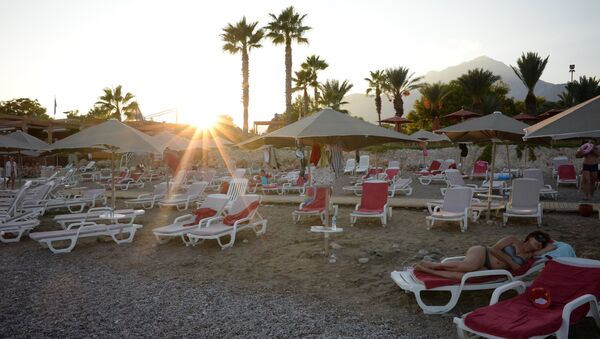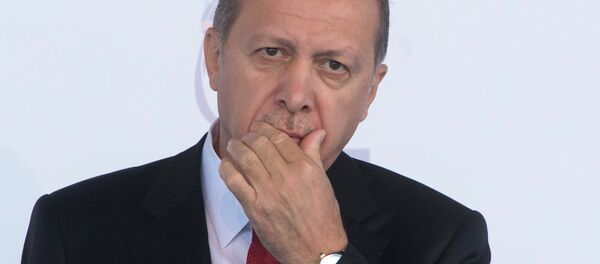Even though the decline in revenues in Turkey's tourist sector will ebb by about a quarter by the year-end, local hotels and restaurants, including those in Istanbul, remain empty.
In 2015, vacationers from Germany, Russia and the United Kingdom accounted for 15.5 percent, 10 percent and 7 percent of Turkey's overall number of tourists, respectively, according to official statistics.
#Turkey tourism is screwed. pic.twitter.com/NOsMIIAIhq
— Joan Salihi (@joansalihi) 22 июня 2016 г.
However, Russians remain resentful following Ankara's downing of a Russian warplane in November, 2015 over neighboring northern Syria, and Moscow is still waiting for an official apology before it will consider lifting punitive sanctions restricting charter flights. As for the flow of tourists from Europe, it began to fall immediately after the terrorist attacks in Paris on November 13, 2015.
One of the most famous beaches of Turkey, Cleopatra Beach in Alanya. Used to be favourite of Russian tourists. pic.twitter.com/3W1ykLaGOK
— ali ornek (@ornekali) 21 июня 2016 г.
This trend further intensified after 11 German tourists were killed in a suicide bombing in Istanbul on January 12, 2016; more attacks followed in March and in June.
Representatives of German travel agencies say that after the January bombing, even some cruise ships changed their routes, setting sail for Greek ports instead of Turkish ones.
According to the Turkish Ministry of Tourism, the number of tourists from Russia, Germany and the UK fell, by 80 percent, 35 percent and 24 percent, respectively. In addition, the recent terrorist attacks reduced the flow of tourists from Greece, Italy and Japan, by 27 percent, 55 percent and 42 percent, respectively.
Hard to stand all the tourists coming to #Antalya #Turkey lately. Amazing crowd over there pic.twitter.com/GbFypvQHET
— Capulcu TurkKick (@TurkKick) 23 июня 2016 г.
The Turkish newspaper Hurriyet quoted traders and shopkeepers as saying that sales had already fallen by 90 percent after the ban of charter flights from Russia and restrictions on the import of Turkish goods.
Experts say that that this year will see about one million German holidaymakers visiting Spain, Italy or Greece rather than Turkey. Additionally, so-called home tourism has gathered strength both in Germany and Russia due to safety concerns.
Bad year for turkey mind. Lost 45% of its tourism trade this year, and not even doing anything at the euros. Bad times!! 🇹🇷🇹🇷
— Ben Pring (@bennypring11) 17 июня 2016 г.
As for the Russian tourists, they also plan to travel to Greece, Bulgaria, Israel, Spain and Vietnam.
After the June 7, 2016 terrorist attack in Istanbul, the British Foreign Office and the US State Department advised their citizens against visiting Turkey.
According to the World Travel and Tourism Council, Turkey's tourist sector accounts for at least 4.7 percent of its GDP, while indirect revenues from the country's tourism activity stand at about 12 percent of its GDP.
The political instability in Turkey may finally lead to the country's economic collapse, with the credit insurance company Euler Hermes expecting about 15,000 bankruptcies of Turkish companies in the next few months, a 8-percent increase compared to 2015.
Despite Ankara's claims that the plane had violated Turkish airspace, both Russian and Syrian military officials have confirmed that the plane never left the skies of Syria.
Russia suspended its visa-free regime with Turkey and imposed an array of restrictive economic measures on Ankara in response to the downing of the Russian Su-24 bomber.
In late January, Turkish Foreign Minister Mevlut Cavusoglu said Ankara was eager to normalize relations with Moscow.





